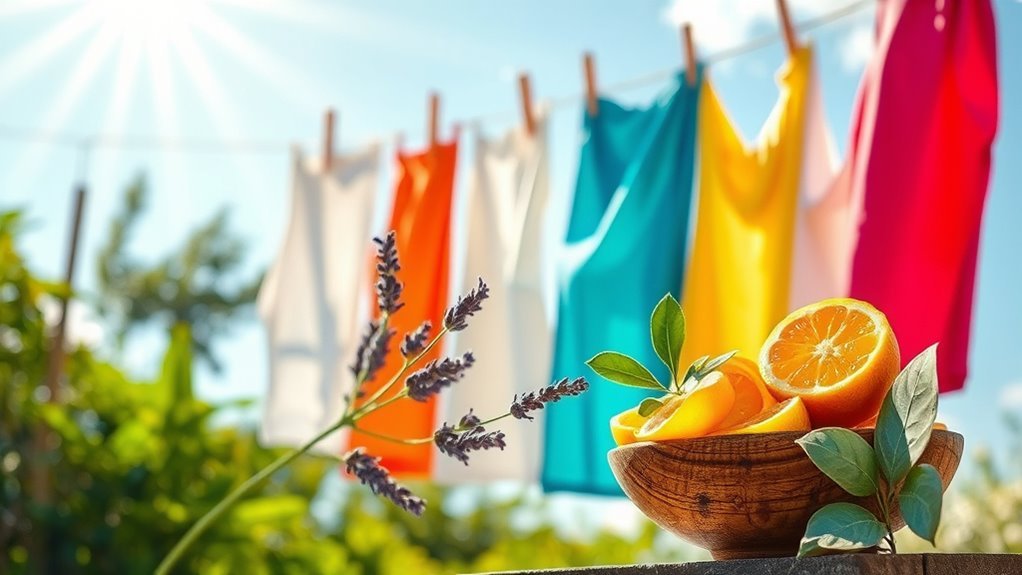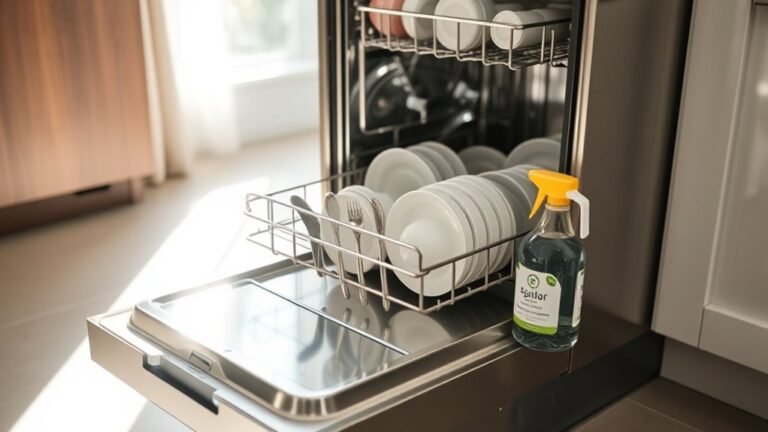Natural Alternatives to Laundry
You can switch to natural laundry alternatives that safeguard your health and reduce environmental harm by avoiding harsh chemicals. Use homemade detergent blending grated soap, washing soda, and baking soda for cleaning power and deodorizing. White vinegar and wool dryer balls naturally soften fabrics and cut drying time. Essential oils add freshness without toxins. Gentle, plant-based soaps and cool water protect delicates. Reusable dryer balls and washable bags reduce waste. Discover more ways to enhance your eco-friendly laundry routine.
Benefits of Using Natural Laundry Products

While conventional laundry products often contain harsh chemicals, natural alternatives offer several benefits that directly impact your health, the environment, and fabric longevity. If you have sensitive skin, natural detergents reduce exposure to irritants, lowering the risk of allergic reactions and dermatitis. Studies confirm that synthetic additives and fragrances in typical detergents often trigger skin issues, especially for individuals seeking freedom from discomfort. Environmentally, natural products minimize water pollution since they biodegrade more readily and lack phosphates, which contribute to eutrophication. Choosing these alternatives also preserves fabric integrity longer; harsh chemicals can degrade fibers, leading to premature wear. By opting for natural laundry solutions, you actively reduce your environmental impact and protect your skin without sacrificing cleaning efficacy, aligning with a lifestyle that values health and ecological responsibility.
How to Make Your Own Laundry Detergent
Choosing natural laundry products is a meaningful step toward healthier living and environmental care, but making your own detergent takes control and customization a step further. When you create detergent using homemade soap and natural ingredients, you reduce exposure to harmful chemicals and tailor the formula to your needs. To get started, consider these essentials:
Making your own detergent boosts control and customization while reducing harmful chemical exposure.
- Grate a bar of homemade soap as the base for cleaning power.
- Add washing soda to enhance stain removal.
- Include baking soda to balance pH and deodorize fabrics.
- Mix in natural essential oils for fragrance and antimicrobial properties.
This approach lets you master ingredient quality, minimize waste, and adapt formulations easily. Evidence supports that homemade detergent with these components effectively cleans while preserving fabric integrity and lowering environmental impact.
Natural Fabric Softeners and Their Uses

You can replace commercial fabric softeners with natural options like vinegar, baking soda, or wool dryer balls, each offering unique benefits for your laundry. Applying these correctly guarantees your clothes stay soft without chemical residues, and they often help reduce static and wrinkles. Understanding their specific uses helps you choose the best method to maintain fabric quality sustainably.
Common Natural Softeners
Although synthetic fabric softeners are widely available, many people prefer natural alternatives due to their gentler effects on fibers and reduced environmental impact. You’ll find that common natural softeners not only protect your clothing but also enhance freshness without harsh chemicals. Consider these options backed by evidence:
- White vinegar: Its acidity breaks down detergent residues, offering fabric softening and deodorizing benefits; the vinegar benefits include maintaining color vibrancy and reducing static.
- Baking soda: Acts as a gentle abrasive and pH neutralizer, softening fabrics and boosting cleaning power.
- Wool dryer balls: Reduce drying time and soften clothes mechanically without additives.
- Aloe vera gel: When diluted, it moisturizes fibers, preventing stiffness.
These choices empower you to maintain fabric quality while respecting your freedom from synthetic additives.
Application Tips and Benefits
Natural fabric softeners offer practical benefits when used correctly, enhancing both the feel and longevity of your clothing. To maximize these benefits, you should add scented alternatives like essential oils to your rinse cycle or use DIY fabric softeners crafted from vinegar and baking soda. These methods soften fabric fibers without the harsh chemicals found in commercial products, reducing wear and static cling. Applying them at the right stage—typically during the final rinse—ensures even distribution. Evidence suggests that natural softeners maintain fabric integrity longer, helping your clothes retain their texture and color. By choosing these alternatives, you gain freedom from synthetic additives while supporting sustainable laundry habits. Keep measurements precise and avoid overuse to prevent residue buildup, ensuring your garments stay soft and fresh.
Eco-Friendly Stain Removal Techniques
Because harsh chemicals can damage fabrics and the environment, exploring eco-friendly stain removal techniques is essential for sustainable laundry practices. You can effectively tackle stains using natural agents that preserve fabric integrity and reduce ecological impact. For example, baking soda gently lifts stains and neutralizes odors, while vinegar solutions break down residues without residual toxins. To maximize your stain removal success, consider these approaches:
- Apply a paste of baking soda and water to stains, let sit, then rinse.
- Use diluted vinegar solutions as a pre-soak to loosen stubborn marks.
- Gently blot stains with a mixture of water and mild soap to avoid spreading.
- Air-dry treated items to prevent heat setting stains.
These methods empower you with safe, effective options that align with your values and need for freedom in a sustainable lifestyle.
Essential Oils for Freshening Laundry

When you want to enhance your laundry’s scent without synthetic fragrances, essential oils offer a potent and eco-friendly solution. Studies show that essential oil blends not only provide pleasant aromas but also possess antimicrobial properties, helping to freshen fabrics naturally. You can customize scent combinations by mixing oils like lavender and eucalyptus for a calming effect or lemon and rosemary for an invigorating boost. Adding a few drops to wool dryer balls or your rinse cycle disperses these fragrances evenly. This method reduces reliance on chemical-laden fabric softeners, aligning with your desire for freedom from harmful additives. By selecting quality oils and experimenting with blends, you maintain control over your laundry’s scent while supporting environmental sustainability and personal health.
Tips for Washing Delicates Naturally
When washing delicates naturally, choosing a gentle, plant-based soap can prevent fabric damage while effectively removing dirt. You’ll want to use cool or lukewarm water, as high temperatures can weaken delicate fibers. Finally, air drying flat or hanging in shade helps maintain shape and prolong fabric life without harsh heat exposure.
Gentle Soap Options
Although delicate fabrics require special care, choosing the right gentle soap can greatly extend their lifespan while maintaining their natural texture. You want a soap that cleans without harsh chemicals, preserving fabric integrity and softness. Castile soap, made from olive oil, offers a biodegradable, plant-based option that’s mild yet effective. Its moisturizing properties prevent fibers from drying out or becoming brittle.
Consider these gentle soap options for your delicates:
- Pure castile soap: natural, chemical-free, and gentle on fibers
- Olive oil-based soaps: nourish fabrics and maintain softness
- Mild, fragrance-free baby soaps: reduce irritation risks
- Wool-specific detergents: designed for protein fibers, preserving strength
Choosing the right soap means safeguarding your freedom to enjoy delicate garments longer.
Water Temperature Tips
Since temperature greatly influences fabric care, choosing the right water temperature is essential for washing delicates naturally. A cold wash is generally your best bet—it minimizes fiber damage, prevents shrinkage, and preserves color integrity. Studies show cold water effectively removes many stains when paired with gentle soaps, making it ideal for fragile fabrics. Avoid a hot wash, which can weaken delicate fibers and set stains permanently. While hot water aids in sanitizing sturdy fabrics, it often compromises the longevity of delicates. By opting for cold wash cycles, you maintain your freedom to care for delicate garments sustainably and extend their lifespan. Remember, the right temperature balances cleaning power with fabric preservation, ensuring your natural laundry routine is both effective and gentle.
Air Drying Techniques
One key factor in preserving delicate fabrics is mastering air drying techniques, which help maintain fabric integrity without the harsh effects of machine drying. By choosing appropriate clothesline techniques and indoor drying methods, you reduce wear and extend garment life. Consider these evidence-based tips:
- Use padded hangers or drying racks to prevent stretching and distortion.
- Avoid direct sunlight, which can fade colors and weaken fibers.
- Position delicates flat on a clean towel when indoor drying to maintain shape.
- Guarantee adequate air circulation to speed drying and inhibit mildew growth.
These practices leverage natural airflow, minimizing mechanical stress. By controlling your drying environment, you gain freedom from energy-intensive devices and protect your delicate fabrics effectively.
Reducing Waste With Reusable Laundry Accessories
When you choose reusable laundry accessories, you greatly cut down on single-use waste generated by traditional laundry products. Reusable dryer balls replace disposable sheets, reducing chemical exposure and drying time. Washable laundry bags protect delicate items without the need for plastic alternatives. Both options extend product life cycles and minimize landfill contributions, aligning with a sustainable lifestyle that values freedom from constant repurchasing.
| Accessory | Environmental Benefit | Usage Tip |
|---|---|---|
| Reusable Dryer Balls | Decrease waste, save energy | Use 3-6 per load for efficiency |
| Washable Laundry Bags | Replace plastic bags | Ideal for delicates and smalls |
| Cloth Detergent Sheets | Reduce plastic packaging | Store in dry place |
| Mesh Laundry Bags | Protect garments, reusable | Separate colors to avoid dye |
| Wool Dryer Balls | Natural, biodegradable | Add essential oils for scent |
Frequently Asked Questions
Can Natural Laundry Products Help With Hard Water Issues?
You might find natural laundry products effective as hard water solutions because they often contain ingredients like washing soda or citric acid that help reduce mineral buildup. These natural agents can soften water, improving detergent performance and preventing residue on your clothes. However, their effectiveness varies with water hardness levels, so you may need to experiment or combine them with other treatments for best results, giving you more freedom from stubborn mineral issues.
Are Natural Laundry Methods Safe for Babies’ Clothes?
When it comes to baby skin, laundry safety is vital since their skin is highly sensitive. You’ll find that many natural laundry methods use gentle, non-toxic ingredients, reducing the risk of irritation or allergic reactions. However, it’s essential to guarantee these alternatives are free from harsh chemicals and thoroughly rinse clothes. Overall, natural methods can be safe for babies’ clothes if you choose products tested for gentle care and maintain proper washing practices.
How Do Natural Alternatives Affect Laundry Machine Maintenance?
Using natural alternatives can positively impact your laundry machine’s longevity by reducing buildup from harsh chemicals, which often cause wear over time. This means you’ll likely face lower maintenance costs, as fewer repairs or cleanings are needed. However, some natural substances might leave residues if not rinsed properly, so regular machine care remains essential. Overall, embracing these alternatives can help you maintain freedom from frequent breakdowns and costly upkeep.
Can Natural Laundry Products Prevent Color Fading?
Did you know that up to 50% of color fading happens within the first five washes? When you use natural laundry products, you’re tapping into effective color preservation techniques that often include natural dye protection. These products tend to be gentler on fabrics, reducing pigment loss and extending garment vibrancy. So, if you want your clothes to keep their original hues longer, choosing natural options can be a smart, evidence-based move that gives you freedom from quick fading.
What Is the Environmental Impact of Natural Laundry Packaging?
When you choose packaging made from biodegradable materials, you greatly reduce landfill waste and pollution. Sustainable sourcing guarantees that the raw materials come from responsibly managed resources, minimizing deforestation and habitat loss. This approach lowers your carbon footprint, supporting environmental freedom by promoting a healthier planet. Evidence shows that such packaging decomposes faster without harmful residues, making it a smart, eco-friendly choice that aligns with your values for sustainability and freedom from harmful waste.






